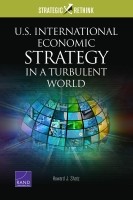| 来源类型 | Research Reports
|
| 规范类型 | 报告
|
| DOI | https://doi.org/10.7249/RR1521
|
| ISBN | 9780833094544
|
| 来源ID | RR-1521-RC
|
| U.S. International Economic Strategy in a Turbulent World |
| Howard J. Shatz
|
| 发表日期 | 2016
|
| 出版年 | 2016
|
| 页码 | 174
|
| 语种 | 英语
|
| 结论 |
The United States Remains a Leading Player in Global Economics- U.S. growth prospects are better than those of any other major developed country.
- Nonetheless, the U.S. share of the global economy has been falling somewhat, largely because numerous developing countries are growing more rapidly.
The World Economy Faces Numerous Challenges- Growth in most major economies either has slowed or is slowing; a major multilateral trade round has fallen through; global debt is increasing, especially that of emerging markets; and developing countries are slowing as well, stemming in part from China's economic slowdown.
- In addition, parallel institutions are emerging, with unknown effect.
- Still, the rules-based international system that has evolved since the end of World War II is as beneficial now as it has ever been, and should be maintained and improved by key players.
The Rise of China Will Affect the United States - U.S.-China trade and investment have grown rapidly. U.S. companies serve the China market primarily through their foreign affiliates in China, rather than trade.
- The United States will benefit most if China's rise can be accommodated within the current global system. Not only are the two economies are intertwined, but many U.S. allies have sizable trade and investment relations with China.
- It is less clear how the United States should approach new China-led development institutions, specifically the Asian Infrastructure Investment Bank and the New Development Bank.
|
| 摘要 |
- With the dual goals of liberalizing trade and maintaining the legitimacy of the World Trade Organization (WTO), the United States should aim to restart a new broad-based multilateral negotiating round; if that is impossible, then the goal should be agreements negotiated with smaller groups of countries that provide benefits to all WTO members.
- U.S. policymakers should strive to complete and approve some version of a broad Pacific trade and investment agreement and a broad Atlantic trade and investment agreement.
- China should continue to be integrated into the global rules-based system based on high standards of openness and adherence to commitments; two mechanisms include developing an on-ramp for joining the broad Pacific agreement and completing a bilateral investment treaty.
- Aid can serve as a valuable tool for improving well-being and supporting growth. Expanding it should be matched with regular evaluations of its effects.
- Sanctions can serve as a valuable tool for changing unwanted behavior. Their use should be continued and turned into multinational efforts when possible, but balanced against the damage they can cause populations in targeted countries and against damage to U.S. standing in the global economic system.
|
| 主题 | China
; Economic Development
; European Union
; Japan
; Southeast Asia
; Trade Barriers
; Trade Regulation
; United States
|
| URL | https://www.rand.org/pubs/research_reports/RR1521.html
|
| 来源智库 | RAND Corporation (United States)
|
| 引用统计 |
|
| 资源类型 | 智库出版物
|
| 条目标识符 | http://119.78.100.153/handle/2XGU8XDN/108271
|
推荐引用方式
GB/T 7714 |
Howard J. Shatz. U.S. International Economic Strategy in a Turbulent World. 2016.
|
|
文件名:
|
x1495316244069.jpg
|
|
格式:
|
JPEG
|

|
文件名:
|
RAND_RR1521.pdf
|
|
格式:
|
Adobe PDF
|
除非特别说明,本系统中所有内容都受版权保护,并保留所有权利。